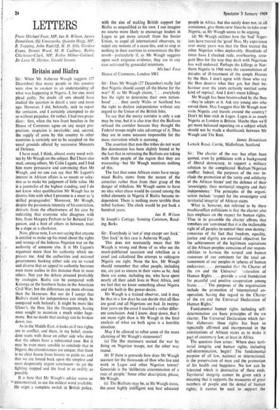Britain and Biafra
LETTERS
From Michael Foot, MP, Ian R. Wilson, James Donaldson, Oji Umozurike, Quintin Hogg, MP. B. Topping, John Radcliff, H. D. Sills, Gordon Evans, Dennis Ward. M. B. Cadbury, Robin Chichester-Clark, MP, Robin Milner-Gulland, Dr Leon M. Shirlaw, Gerald Secrett.
Sir: When Mr Auberon Waugh suggests (27 December) that many people in this country were slow to awaken to an understanding of what was happening in Nigeria, I, for one, must plead guilty. No doubt all sips should have studied the question in detail a year and more ago. However, I did, belatedly, seek to repair the omission, and I certainly attempted to do so without prejudice. Or rather, I had two preju- dices : first, when the two front benches in the House of Commons agree on any major pro- position, suspicion is inevitable; and, second, the supply of arms by this country to other countries is certainly not to be accepted on the usual grounds offered by successive Ministers of Defence.
I have read, I think, almost every word writ- ten by Mr Waugh on the subject. But I have also read, among others, Mr Colin Legum, and I find him more persuasive and convincing than Mr Waugh, and no one can say that Mr Legum's interest in African affairs is so recent or selec- tive as to make his judgment of little value. He is a journalist of the highest standing, and I do not know what qualification Mr Waugh has to dismiss him with what I presume is a sneer as 'a skilled propagandist.' Moreover, Mr Waugh, despite the passionate intensity of his conviction, detracts from the effectiveness of his case by indicating that everyone who disagrees with him, from Margery Perham to Sir Bernard Fer- gusson, and a host of others in between, must be a dupe or a charlatan.
Now, please note, I am not saying that anyone is entitled to make up his mind about the rights and wrongs of the hideous Nigerian war on the authority of someone else. It is Mr Legum's argument more than his authority which im- presses me. And the authorities and national governments backing either side are so varied and diverse that an appeal to authority becomes even more useless in this instance than in most others. Nor can the debate proceed profitably by analogies. Biafra can be compared with Katanga or the Southern States in the American Civil War; but the differences are more obvious than the likenesses. But nor do I accept that Biafra's stand for independence can simply be compared with Ireland's. It might be more like Ulster's, the Ibos, like the Orangemen, having once sought to maintain a much wider hege- mony. But no doubt that analogy can be broken down, too.
As in the Middle East, it looks as if two rights are in conflict, and there, in my belief, unwis- dom starts with those on either side who deny that the others have a substantial case. But it may be even more sensible to conclude that in Nigeria the circumstances are unique; that there is no clear lesson from history to guide us; and that we are forced back upon the simplest and most desperately urgent conclusion—to get the fighting stopped and the food in as swiftly as possible.
It is here that Mr Waugh's advice seems so :5-0'misconceived, to use the mildest word available. He urges a complete switch in British policy, with the aim of making British support for Biafra as unqualified as his own. I can imagine no course more likely to encourage leaders in Lagos to get more aircraft from the Soviet Union, to expel all international observers, to reject any notions of a cease-fire, and to stop at nothing in their exertion to exterminate the Ibo revolt—particularly if, as Mr Waugh suggests upon such exiguous evidence, they are in any case activated by genocidal intentions.


































 Previous page
Previous page